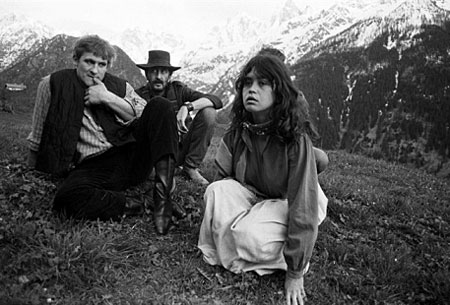| Home | Filmography | FactsOfLife | Relatives | Sources | Photos | About | Contact |
| previous year | 1977 (25) | next year |
|
[Kraft]: homesick in USA, returns to Paris. Is cast by Buñuel for his Cet obscur objet du désir but she quits. [BuetJ] “I did not refuse to work for Buñuel but I changed my mind... Actually, Buñuel didn’t want to make films anymore, he lead a retired life in Mexico. But Silberman, old screw, wanted to ‘make’ the last film of Buñuel, who told him: ‘I don’t want to shoot anymore, I’m tired, I’m deaf...’ At last he got fed up and, looking at a picture of Last Tango, he said: ‘With the little girl, there, in the film!’ I meet Buñuel, I read the scenario. It was a remake of La Femme et le Pantin (1958). Again a old with a young... ok! Next Buñuel dresses me like Deneuve, with very bourgeois tricks. Let’s say that I was not quite at ease. At the other hand, he let me take intensive courses of flamenco during two months, and that I loved. I vented, it was wonderful! [laughs] I leave for Madrid. It was the big come-back of Buñuel in Spain, after the depart of Franco. Since Tango was forbidden, an army of paparazzi awaited me at the railway station in Madrid. They said: ‘What are you going to do here?’ ‘I’m going to shoot Cet obscur objet du désir with Luis Buñuel.” Next day, of course, headlines in all the newspapers. I’m called at the production director. ‘You are not allowed to say anyting!’ I was twenty-two, didn’t have a press agent, nor a body gard. Buñuel mounted his films at the same time he shooted. He was always behind his screen: a man with a tv instead of a body, and two feet thrusting out. The assistant moved between the director and me. It was surrealistic. I begin with a scene of seduction that consisted of a dance behind a grid. I started a delirious trick [laughs], half rock, half flamenco. Buñuel said ‘Mick Jagger!!!’ and I return to the hotel. The whole night I waited for them to put the schedule for the next day under my door. That smelt fishy. I knew the script very well, but nobody talked to me. Everybody behaved very cowardly, evasive. In the morning I see Buñuel arriving, who says: ‘You rebel! you rebel! [laughs] This can’t be...’ In short, I’m sent back to Paris, without being payed, nor compensated. My settlement is that he had to take two actresses to replace me, Carole Buquet et Angelina Molina.” [BuetJ] With Losey, they wanted to do La Dame aux camélias. I liked Losey very much. He failed to convince the producers of the time, Toscan and Drucker. Joe [Losey] asked me to meet them. In those days I was actually ‘rock'n roll’ [laughs], I smoked joints from morning till evening, I have to admit it. I arrived in a daunting state, so they decided to do another film, Les Routes du Sud (1978). I remember a lunch with Montand and Joe. Joe boozed, he was drunk. He said to me: ‘You don't going to smo… smoke, hey, du… during th… this film!’ I, answering: ‘You don't going to drink, hey!’ It was really the pot calling the kettle black. He didn’t have to teach me. He and Montand were completely tipsy. Montand said: ‘She smokes, she takes drugs’. In short, suddenly the film was cancelled. Later it was Miou-Miou who got the part. People accept from a mail actor that he is in a deplorable state, but for us it’s unforgivable. Main role of Laura in Violanta by Daniel Schmid with Gérard Depardieu (released 1978-03-22 France). |
|
|
[BuetJ] Next there was Rivette. He came to see me and said: ‘Maria, I would like to shoot with you’. He was under the influence of tranquilizers. We make an appointment in Paris, in his preferred cafe at the Champs-Elysées. I arrive, see a weirdo sitting cross-legged who says: ‘You know, I write the scenario at the same time that I shoot. What would you like to do?’ I reply: ‘I don’t know, a thriller, a detective...’ He started right there. ‘And with whom would you like to play?’ ‘Ben, I don’t know, with my comrade Joe [Dallessandro]’ [laughs]. It became Merry-Go-Round (1977). Nowadays you can’t make films that way anymore. It was the nouvelle vague [new wave], everything was possible. I got a little nervous, because Rivette, he really is someone who does nothing in a film. We had Lubtchansky who did every movement of the camera, and someone else wrote the text. While the actors are present. Rivette, he had the attitude of an achiever. Above all he had the gift of unifying his people. [IMDb MS] In Galan (West Germany) an article Wann wird sie wieder tanzen...? by Tony Crawley is published (1977, Iss. 5). |
 With Depardieu in Violanta
With Depardieu in Violanta